What are the best sweeteners for the keto diet? Check out this comprehensive guide to baking with sugar substitutes, and learn how to get the taste and texture you crave!
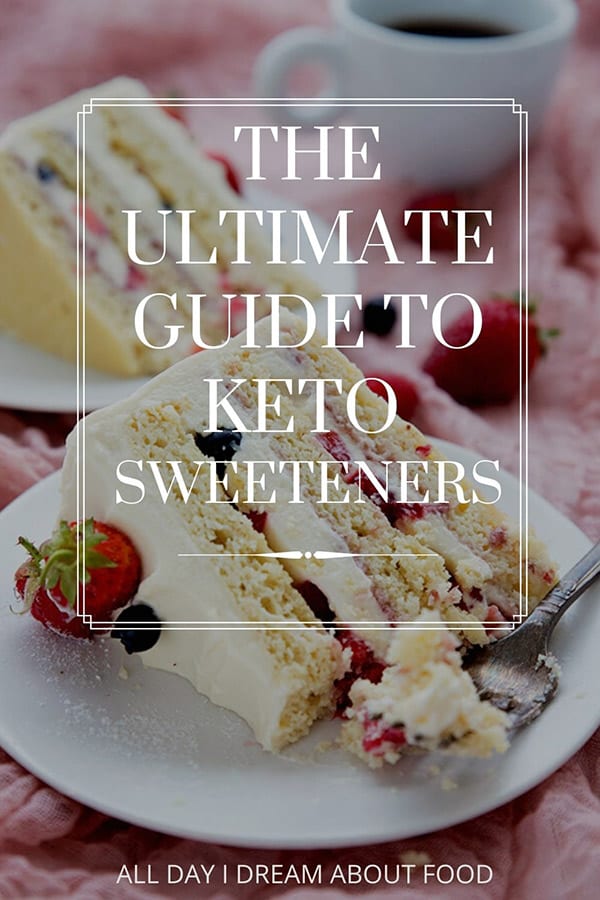
Today, my keto friends, I am imparting some of my vital knowledge and deep wisdom about using keto sweeteners. We will discuss all of their pros and cons, and how they affect the outcome of your keto desserts.
In advance of the holiday baking season, I figured you could put this information to good use. Because if you’re anything like me, you like to get an early jump on your keto holiday cookies!
This is actually an abridged version of the in-depth keto sweetener section in my book, The Ultimate Guide to Keto Baking. I think you will find it very informative.

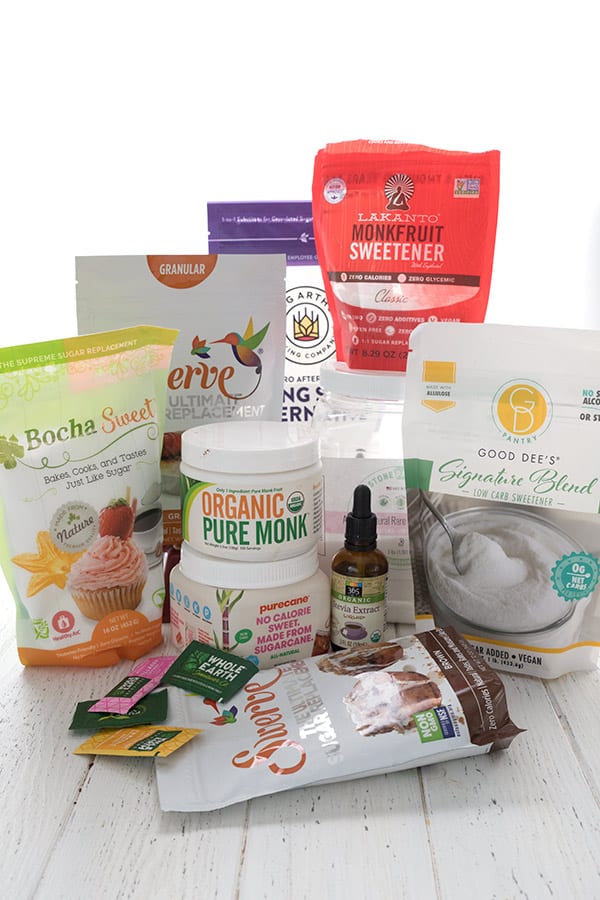
What is the best keto sweetener?
I’m sorry, I simply cannot answer that for you.
I’m not being willful or stubborn, or deliberately withholding information. It’s simply that there is no such thing. Yes, you read that right – there is no such thing as the best keto sweetener.
Here’s why: Everyone experiences these sugar substitutes differently. It’s almost as individual as the individual themselves.
- Some people experience an unpleasant aftertaste with one and not another.
- Some people suffer from GI issues or headaches when consuming certain sweeteners.
- Some people see a blood sugar rise when other people do not.
- Some people may even experience an allergic reaction to certain sweeteners.
With the sugar substitutes market constantly expanding and changing, it’s much more about finding what sweeteners work best FOR YOU.
What are the best sweeteners for keto baking?
Ah, now we’re on to something. This is my territory and one that I have researched extensively. I have experimented with a wide array of sugar substitutes and I can tell you straight up that none of them behaves exactly like sugar.
They all have very different properties and the sweetener(s) you choose will impact the outcome of your recipes. The trick is to understand their different attributes and use them to advantage.
Consider the final product before choosing your sugar substitutes. What are you trying to make? What consistency are you trying to achieve? Do you want it crisp or soft? Chewy or cakey? Should it be gooey or firm?
Most of the popular brands on the market are actually blends of two or more keto sweeteners. For simplicity’s sake, I am going to break them down into their main ingredients.
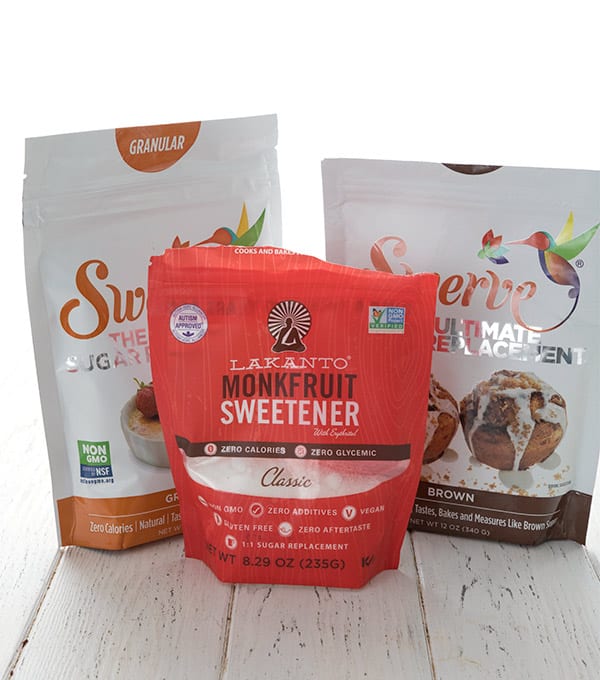
Erythritol
What is it?
Erythritol is a sugar alcohol (polyol) that is naturally present in some fruits and fermented foods. For mass production, it is made by fermenting a glucose syrup with enzymes.
It is unique among sugar alcohols in that it has zero carb impact. Our bodies simply do not recognize it as a carb so it does not impact blood sugar at all. And unlike many sugar alcohols, it does not cause gastrointestinal issues for most people.
How does it work?
Similar to sugar:
– Erythritol mimics sugar in its crystalline structure, so it helps whip air into butter and egg whites.
– It also browns and crisps up nicely and it can even be coaxed into caramelizing.
Differs from sugar:
– It’s only 70% as sweet as sugar, which is why most brands combine it with other sweeteners, to make it measure cup for cup.
– It’s non-hygroscopic, meaning that unlike sugar, it does not attract or hold onto moisture, which can cause baked goods to be dry and crumbly if they don’t have enough fat.
– It can re-crystallize as it cools, particularly in liquid applications like sauces, custards, and ice cream.
– Some people experience a mouth-cooling sensation, similar to sucking on a mint. Not everyone experiences this, and often mixing it with other sweeteners eliminates this sensation.
Major Brand Names: Swerve, Lakanto (this is mostly erythritol… do not be fooled by the fact that it calls itself a “monk fruit sweetener”), So Nourished, ZSweet.

Xylitol
What is it?
Xylitol is also a sugar alcohol found in some fruits and vegetables, as well as in wood and corn. It is usually manufactured commercially from corn or birch trees.
Some, but not all, xylitol is absorbed by the intestines into the bloodstream. This means it can cause some gastrointestinal discomfort when consumed in large amounts. It can also have an impact on blood sugar.
WARNING! The biggest issue with xylitol is that it is highly toxic to dogs.
How does it work?
Similar to sugar:
– It has a crystalline structure so it can whip air bubbles into butter and egg whites. It’s also as sweet as sugar.
– It’s more hygroscopic than erythritol so it attracts moisture and it doesn’t re-crystallize as it cools. Xylitol is great for ice creams and sauces to keep them soft.
Differs from sugar:
– Xylitol doesn’t caramelize or crisp up very well. This can cause problems for baked goods that need a crisp texture, like many keto cookies. They will turn out much more cakey and soft if you use xylitol.
– Definitely do NOT use for meringue, as it will stay gooey and soft, and won’t come off the parchment paper.
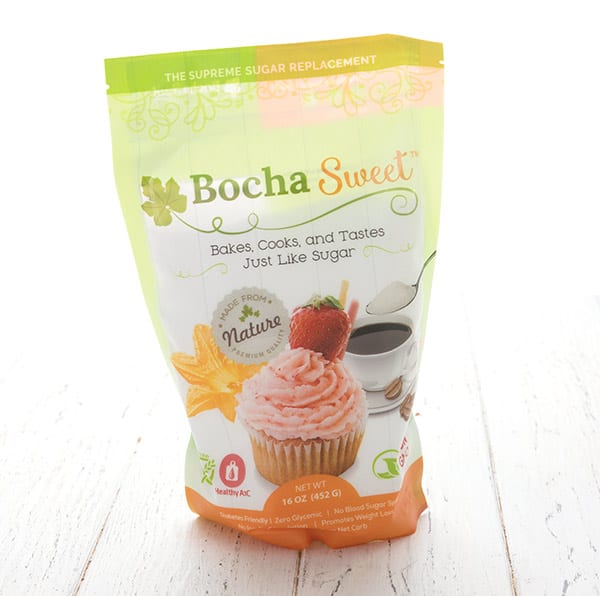
BochaSweet
What is it?
BochaSweet is the brand name of a unique sweetener derived from the kabocha squash, a type of winter squash also know as Japanese pumpkin.
Like erythritol, it seems to have little to no impact on most people’s blood sugar. But like xylitol, it can cause some gastrointestinal upset when consumed in large quantities.
In many ways, BochaSweet functions a lot like xylitol (they are both pentose sweeteners), but it does not appear to be toxic to household pets.
How does it work?
Similar to sugar:
– BochaSweet is as sweet as sugar and so can be used as a cup-for-cup replacement, without an apparent aftertaste.
– It is more hygroscopic and doesn’t re-crystallize so it’s great in sauces, custards, and ice creams. (I have started using it in combination with Swerve in all of my keto ice cream… they stay scoopable even straight from the freezer!).
Differs from sugar:
– Just like xylitol, BochaSweet will not crisp up or brown very well. Cookies end up soft and cakey, and meringues are so gooey that they won’t come off the paper.
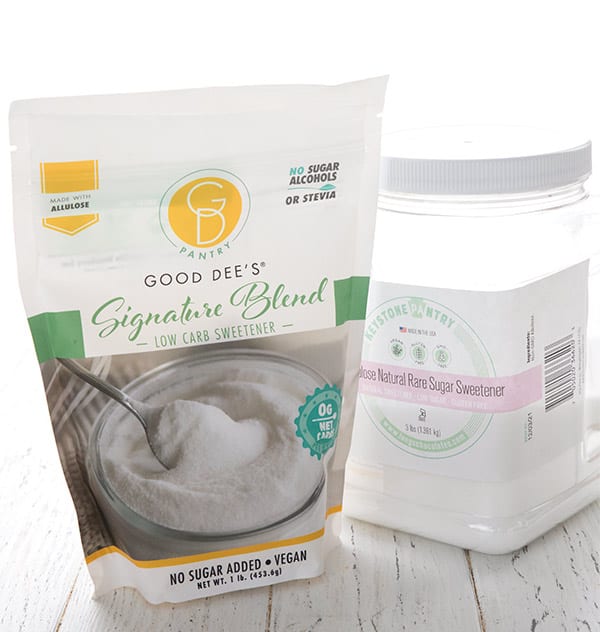
Allulose
What is it?
Allulose is a relative newcomer on the sugar alternative scene and has become incredibly popular. It is a monosaccharide, which means it really is a “sugar”, but one that our bodies don’t treat like a sugar or a carb. It is largely excreted without ever affecting blood glucose levels.
However, I caution you from personal experience that large amounts can cause serious GI distress. Many people don’t seem to suffer from this, but some of us do and it’s…not fun.
So it’s worth testing on yourself in small amounts and building up from there.
How does it work?
Similar to sugar:
– Allulose caramelizes nicely and tends to be hygroscopic, keeping sauces and ice creams soft, and baked goods tender.
Differs from sugar:
– Allulose is only 70% as sweet, which means you need more to sweeten your desserts.
– While it caramelizes well, it doesn’t crisp up well and baked goods tend to be soft and cakey. Even just a little allulose, in combination with other sweeteners, can prevent your cookies from becoming crisp.
– It can over-brown the outside of baked goods, especially the parts that are touching the sides of the pan. Cakes can have a dark, almost burnt appearance, although they aren’t over-cooked.
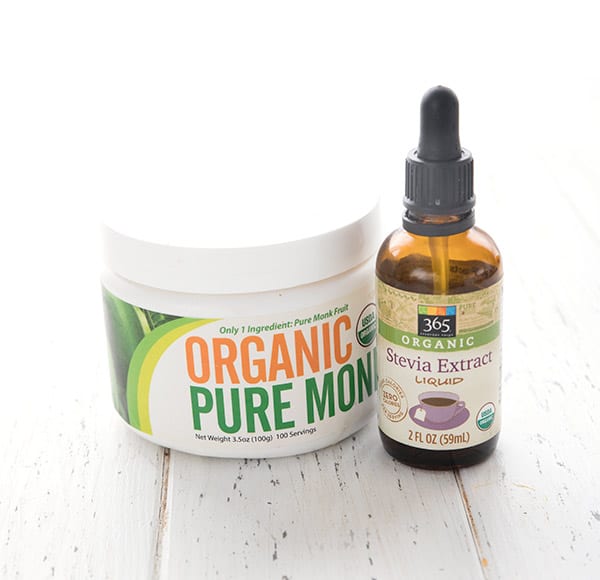
Stevia and Monk Fruit
I am lumping these two together because they have many similar properties and behave much the same way.
What are they?
Both stevia and monkfruit are naturally derived, plant-based sweeteners that are hundreds of times sweeter than sugar. Because they are extremely concentrated, a tiny amount can sweeten a whole recipe.
While that may sound like a good thing, it can have major implications for your keto baked goods. Read on…
How do they work?
Concentrated sweeteners like these have no “bulk” – they have little in the way of weight or volume so they don’t add much to your recipe other than sweetness. They can’t contribute anything to texture or consistency, and they don’t caramelize, crisp, or brown your baked goods.
Bulk is an important factor in anything from cupcakes to frosting. Substituting a non-bulk sweetener means your keto treats may not rise properly, may be more fragile, and may not set properly.
“Monk fruit sweetener”
Please be aware that many brands that bill themselves as “monk fruit sweetener” are actually mostly erythritol. The main ingredient is erythritol, with a little monk fruit to make it sweeter. This means that the sweetener will behave mostly like erythritol.
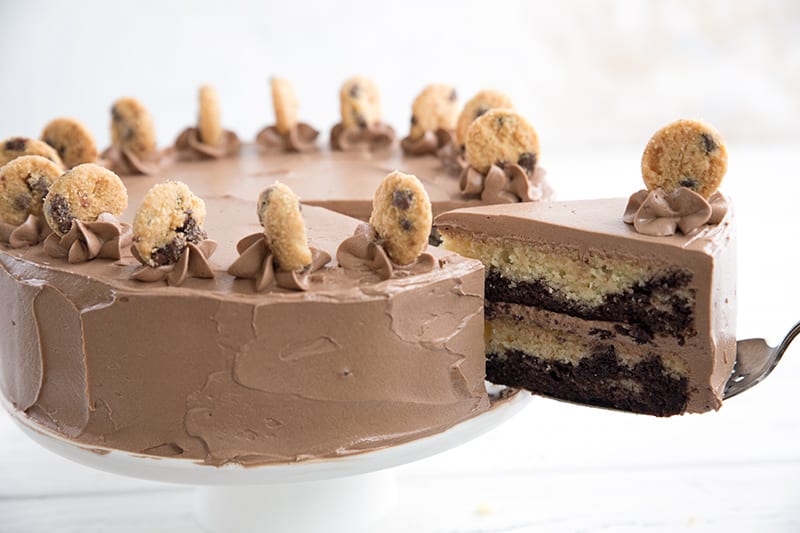
How to use sugar substitutes
I’ve thrown a ton of information at you and I know it’s hard to digest it all. I do this for a living and still I have times when a certain sweetener doesn’t behave the way I think it should. But here’s a quick cheat sheet on what to use when:
Want crisp keto cookies? Use erythritol based sweeteners like Swerve, Lakanto, or So Nourished. Other options will make your cookies soft and cakey. I highly recommend Swerve Brown for the best brown sugar substitute for cookies!
Making a keto cake recipe? Use any sweetener that has bulk (erythritol, BochaSweet, xylitol or allulose), but do be forewarned that some are not quite as sweet as sugar and you may need more of them.
Making a keto frosting? You need a bulk powdered sweetener to give your frosting structure. Erythritol, xylitol, and BochaSweet all have confectioners (powdered) versions. Allulose may as well but I am unsure of brands.
Want a gooey consistency? Try using BochaSweet or allulose, or combine it with another erythritol based sweetener. This combo is perfect for things like keto caramel sauce or my keto pecan pie.
Want keto ice cream that stays scoopable for days? My recommendation is half Swerve and half BochaSweet or allulose. Using only erythritol based sweeteners makes your ice cream rock hard, and all BochaSweet makes it too soft (it stays like soft serve!).
Just trying to sweeten your coffee? Use whatever you like best. They all work well if you don’t need a certain consistency so this is a matter of personal preference.
Still have questions?
Leave a comment and I will do my best to answer!
Adding to the confusion is that many brands on the market are blends of the keto sweeteners I outlined above. Blending sugar substitutes can maximize their sweetness and reduce potential aftertastes.
But I’ve tried such a wide array of sweeteners, I have a good idea of how most of them work. I can also take an educated guess based on the ingredients list. So drop me a line and I will give you all the information I can.

Free Bonus: Secrets to Keto Baking!
Sign up for your favorite recipes delivered straight to your inbox plus get our FREE bonus: Secrets to Keto Baking!



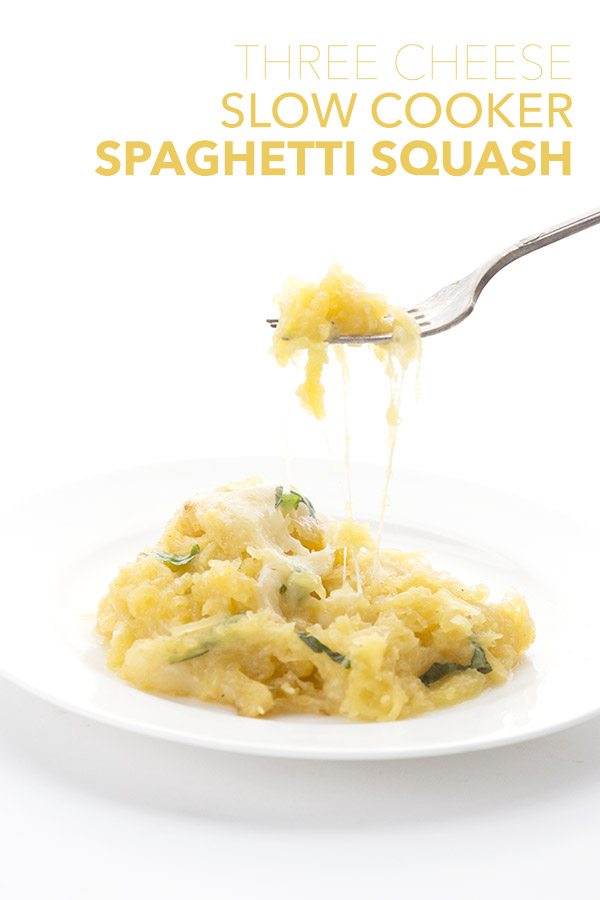
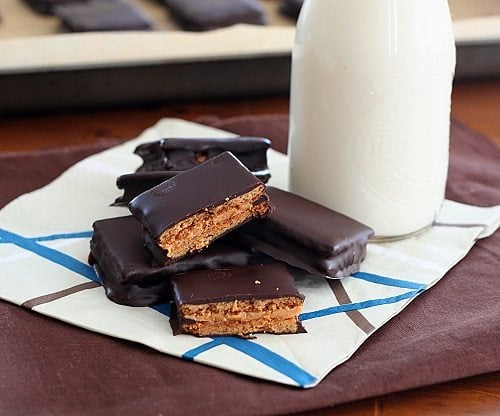










Thank you, Carolyn, this is an excellent, clear run-down on sweeteners! I’ve especially learned from you about the properties of sweeteners used in different recipes such as cookies, cakes, ice cream, toffee, icing, and syrups. I usually use a combination of sweeteners for almost everything just to balance out the pros and cons of each, but knowing about the “crisping” factor of erythritol, and the softening characteristics of xylitol, allulose, and Bocha Sweet has really informed my dessert making.
So incredibly useful……thank you!!!!! Have tried them all but have never done such a detailed side by side comparison looking at crispness vs browning vs use in creamy desserts. This is a wonderful guide….timing could not be better. Merry Xmas to us from Carolyn…..Merry Xmas back at you (a bit early).
What are your thoughts on Sucralose?
Not a fan… doesn’t bake well, doesn’t taste great, and it’s really not very good for you. That’s why I didn’t feature it here at all, there are so many better options.
Thank you so much for this guide, it’s great! With granular erythritol based sweeteners I sometimes notice the grittiness that can come with it. Would it be ok to always use a confectioners version of E-based sweeteners to eliminate the grit or would it negatively change the outcome of some recipes?
Hi! Many of your cakes and baked goods you use granulated swerve. In the absence of such, would you replace it with swerve confectioners or something like lakanto monk fruit?
Thanks for this information! It certainly comes at a good time..lol. But my question is about liquid sweeteners. I read somewhere that the carbs in powdered sweeteners come from the additives. Does that mean liquid sweeteners are carb free? I’m specifically speaking of Splenda liquid for my coffee. It tastes the best (for coffee) to me.
Hi Sandra… this is entirely incorrect. As stated in this article, the “carbs” in these sweeteners are not treated like carbs in our bodies. Thus, they aren’t coming from “additives”. And no, liquid sweeteners aren’t necessarily carb free. It depends on what kind you are referring to.
Splenda is sucralose, which is a man-made substance. Feel free to use it but I do not like it at all and don’t think it’s healthy option.
Hi, What about Sucralose and Stevia?
Which sugar substitute would you recommend for making a keto toffee? I tried Allulose but it didn’t seem to get to the hard stage once it cooled it was still kind of chewy. Maybe I didn’t cook it long enough?
Erythritol based sweeteners are the only ones that will firm up properly for toffee. https://alldayidreamaboutfood.com/low-carb-cracker-toffee/
THANK YOU!This helps so much!
First of all thank you for all your knowledge and wonderful recipes! I had gastric bypass 7 years ago and used Splenda since then. I tried all the sweetners you have written about and they made me so sick. I went back to Splenda. Recently I tried Whole Earth brand.Whole Earth has different blends so make sure you read their labels. I use the one that has erythritol, stevia leaf extract, and monk fruit extract. It doesn’t upset my stomach at all! Just thought some of your follows would like to try this. I’m a very happy Keto person now.
THANK YOU – I recently started my Low-Carb lifestyle change and have found your site to be the most reliable source. Any questions , or looking for a recipe replacement, I come here first now. Thank You so much for sharing your knowledge so willingly.
I often have to resort to refrigerating keto cookies and bars as not everyone in the house enjoys them-go figure!:) Once refrigerated, they develop a grittiness that’s difficult to ignore. Will switching from granular to powdered sweetener prevent this?…or switching to a different sweetener altogether?
My personal experience is the same – the “grit” and cooling affect is intolerable for me. Swerve (for me) is the worst for that. I’ve had more success with Sukrin and Lankanto. I also have great success with Xylitol – but, am always terrified a crumb might make it to the floor (I have pets). I almost always have to mix several sweeteners though. I use vanilla liquid stevia to push sweetness to acceptable taste in sweetness, many times. I really like the Sukrin brand quite a bit though! There’s also a thick liquid I use with no flavor, it starts with an “I”, but, I’m not home, so I can’t remember the name. Comes in a bottle a little bigger than the liquid stevia bottles with a squeeze dropper too.
Have you rated Pure Cane?
I’ve tried it and felt it was only so-so. Because it’s 2x as sweet as sugar, it can’t add to structure as much. Made some cookies with it and they were a bit dry and not really crisp or chewy.
Thank you so much for this write-up! It is a great breakdown of the various sweeteners and I’ll be sure to flag this for my holiday baking!
This information is golden! Thank you for sharing your knowledge!
Thank you Carolyn! This is very helpful. You ate the best. I couldn’t do Keto without you.
I have a sensitive palette. Erythritol isn’t just cool it is very bitter. Stevia has a black liquorice aftertaste that too is bitter. I’m only a month in and $100.00 out on sweeteners. Any advice?
BochaSweet or allulose. Most people find that they have no aftertaste with these. Sadly… they won’t crisp up your cookies. 🙁 But it’s better than nothing! They’re fine in cakes and muffins, mousses, custards, that sort of thing.
I mix Swerve and Stevia. They tend to cancel out each other’s aftertastes for me. I use mostly erythritol with just a touch of stevia. The other benefit is that because stevia is so super sweet, I don’t need as much Swerve to get the sweetness I’m looking for. I rarely use the total amount of sweetener a recipe calles for, which saves money in the long run.
This is such great information! I keep various types of keto approved sweeteners on hand for baking, but often get so confused on which ones to use. I wish this information was laid out as a printable chart to refer to when cooking/baking. Would save so many ruined recipes.
You need my baking book then! It will save you from keto baking heartache. https://amzn.to/2n0XQWf
This book is my Baking Bible. Absolutely love it!
To date I only tolerated Stevia Given that all others mentionned led to intestinal problem (fodmap)
Do you know if one can find granulated Stevia for baking?
Thanks
Well you can but it’s combined with bulking agents like maltodextrin so it’s not great for you. And others combine it with erythritol so that may be a problem for you.
I was recently surprised to see Truvia listed as an acceptable sweetener on Diet Doctor – the one my husband used to use has cane suger but I’ve found that there are indeed different Truvia blends. I’ve recently purchased Truvia Sweet Complete which shows ingredients as Stevia Leaf, Chicory Root and Erythritol – plan to try it for baking. Their packetized version does not list the chicory root, but so far it seems to work well in my coffee and tea without causing reflux which seems to be an issue with most of the other sweeteners.
They have a baking blend that has cane sugar but they have the regular kind that’s mostly erythritol with a little stevia. That one is 2x as sweet as sugar so you need less of it.
Hi. I’ve read this article several times as I continue to explore sweeteners. I do notice from erythritol the cooling effect which isn’t pleasant with baked goods. I’ve been combining allulose with erythritol/monkfruit to see if it’ll counteract the cooking effect but it’s so far not working for me. I love baking and we love your cheesecake recipe! Biscotti w/your dried cranberry recipe which I’ve made now many tines.
Any other suggestions for sweeteners would be appreciated. What do you think of allulose?
Allulose in high concentration makes my tummy pretty upset but it doesn’t do this to everyone. Still, it has its limitations… can’t get cookies to crisp up at all!
Trim Healthy Mama brand of pure stevia does not contain maltodextrin, it is organic, and has a more pleasant taste than other stevia powders
Thanks this is very helpful, especially the recommendations for which sweetener to use in what kinds of baked goods. I wonder if you have any comments on where on the spectrum you’d put yacon syrup or powder? I believe you’ve used the syrup in some recipes. I am guessing yacon is better for soft (rather than crispy) outcomes? Thanks again for all your applied research!
Yacon syrup is still a “sugar” despite its low glycemic index, so should only be used sparingly to get a brown sugar or flavour and color. That’s how I use it. When used in small amounts, like 1 tbsp, it will only add about 1g carb to each serving.
This is a great writeup! There are so many more options available compared to when I first went low carb back in 2010. There’s a lot of trial and error (and disastrous results no one wants to eat) when you’re trying to figure things out.
I’ve recently been experimenting with ‘brown sugar’ substitutes (Surkin Gold, Swerve Brown) and have great success with these too. Surkin Gold worked phenomenally well combined with allulose as a crust rubbed over a roasted pork shoulder – caramelized perfection! I’m keen to try it mixed with spices as a dry rub for wings next. There’s a lot more going on with the brown sugar substitutes than the standard/confectionery ones though, and I think the risk of digestive distress remains the same.
Have you tried King Arthur’s Baking Sugar Alternative yet? I saw your previous post about their new flour so I was hoping you were going to review this too! I have a bag sitting here but have held off on trying it as it’s pretty expensive.